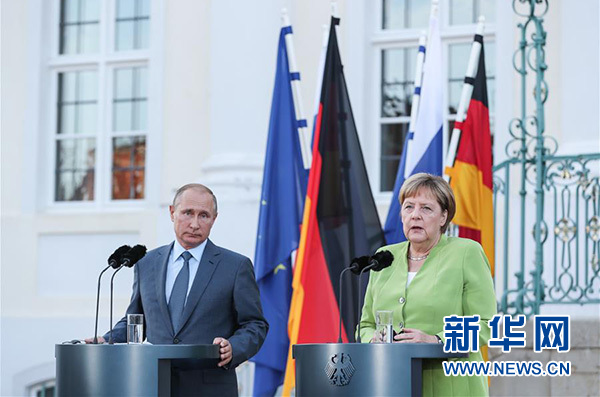The Merkel-Putin meeting
- By George N. Tzogopoulos
 0 Comment(s)
0 Comment(s) Print
Print E-mail China.org.cn, August 27, 2018
E-mail China.org.cn, August 27, 2018

Relations between the West and Russia have been difficult since the beginning of the Ukraine crisis in 2013. Both the U.S. and the EU largely consider Russia a problem and not part of the solution. U.S. President Donald Trump is attempting to partly modify this approach but is facing opposition by a significant part of the American establishment. His recent comments at the Helsinki Summit press conference earlier this year with Russian President Vladimir Putin, for instance, generated an intense domestic debate. Trump, in a not so typical fashion, had to rephrase some of his statements to escape criticism.
In response to different issues over the years, the EU has been continuously applying sanctions against Russia. However, while Brussels remains strict in its policy, some powerful member-states are fostering good economic ties with Russia. Germany is the most characteristic example. The recent meeting between Chancellor Angela Merkel and Putin at the Meseberg Palace outlined the will of the two countries to look towards the future. This was the first bilateral visit by the Russian president in Germany since 2014.
Berlin and Moscow enjoy excellent energy relations. The two sides have agreed to construct the Nord Stream II pipeline, which will complement the Nord Stream I in transporting Russian natural gas under the Baltic Sea to Germany and other European countries. Ironically, this new pipeline is expected to be realized during a period in which the EU is seeking to achieve energy independence from Russia. Although Merkel is talking about an "economic" project, its political agenda can hardly be hidden. Energy is directly connected to geopolitics as undergraduate students of international relations are learning at universities.
To no surprise, Ukraine does not favor the Nord Stream II. The impact of the pipeline using the Ukraine corridor as a passage for the transportation of Russian natural gas to Europe has not been precisely assessed. Both Merkel and Putin have played down the fears expressed by Ukraine. However, the more Russia relies on transit alternatives beyond Ukraine, the more Ukraine will be internationally isolated. A recent Forbes article illustrated the Nord Stream II as its "worst nightmare."
At the international level, the fiercest opponent of the Nordstream II is the U.S. During the Obama years, the American administration was largely concerned about geopolitics. These days, the Trump administration principally cares about trade and economics. It seeks to boost the U.S. shale gas industry and find clients abroad. The German-Russian energy collaboration is undermining this goal. Alternatively, Washington advocates for the construction of an LNG facility in Germany for U.S. shale gas to be shipped there and reach the German market.
In his recent visit to the White House, President of the European Commission Jean Claude Juncker managed to provisionally avert a trade war and pledged that the EU would import more shale gas from the U.S. It remains to be seen if he will be able to keep his word and exert pressure on member-states to follow the guidelines, especially when countries like Germany are acting in their own interests. Obviously, this is not the case for smaller EU member-states which have no choice and need to respect the European framework regarding their relations with Russia. Bulgaria, for example, finds it difficult to copy the German paradigm.
From another perspective, it's nice to see that Merkel and Putin are determined to enhance their cooperation on international problems. The crises in Ukraine and Syria were discussed in detail. The two leaders disagree on issues such as the annexation of Crimea and the future of Bashar al-Assad but want to continue their dialogue on these subjects. Merkel was right in suggesting that Russia has a critical role to play as a permanent member of the U.N. Security Council. Of course, she is also looking for real success in Germany's foreign policy. The stabilization of Ukraine has been a personal risk for the Chancellor since 2015, as she devoted political capital to the Minsk accords. The chaos in Syria is fueling the refugee crisis and has caused serious rifts between Merkel's Christian Democratic Party and the Bavarian Christian Social Union.
Some scholars suggest Trump's policies might facilitate a rapprochement between European leaders and the Russian president. Against this backdrop, Merkel and Putin want to keep the Iran deal alive. They outlined this common intention at the Meseberg Palace. Nonetheless, there are certainly limits in German-Russian relations and more widely in EU-Russian relations as long as the sanctions remain in place.
Despite the lack of specific agreements between Merkel and Putin in their recent meeting, the fact that they are holding bilateral talks is a positive sign. International relations require synergy and good will. Zero-sum mentalities belong to the Cold War era.
George N. Tzogopoulos is a columnist with China.org.cn. For more information please visit:
http://www.china.org.cn/opinion/GeorgeNTzogopoulos.htm
Opinion articles reflect the views of their authors, not necessarily those of China.org.cn.






Go to Forum >>0 Comment(s)